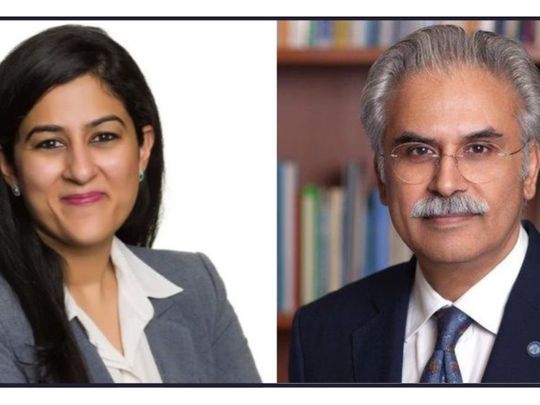
Islamabad: Two special aides to Pakistan Prime Minister Imran Khan resigned on the same day after the assets and dual nationalities of several of his special assistants were made public prompting an attack on the government from the opposition.
First to step down was Special Assistant to the PM on Digital Pakistan Tania Aidrus with Special Assistant to PM on Health Dr. Zafar Mirza following soon after. They made their resignations public on Twitter today.
SEE ALSO
The resignations come days after the opposition criticized the government following details of the assets and dual nationalities of 20 advisers and special assistants were made public by the government. Meanwhile, a petition was filed in the Islamabad High Court challenging the appointment of special assistants who had dual nationalities.
The news of the two resignations in a day prompted debate on social media about dual nationalities. The platform also saw hundreds of tweets in support of the aides who many Pakistanis termed “competent managers”. Many appreciated the services of Dr. Mirza describing him as “Pakistan’s COVID czar” and expressed concerns about the impact of his resignation on country’s fight against the pandemic.
“It was a privilege to serve Pakistan”
Both special assistants had returned to Pakistan to serve their homeland after years of overseas experience.
Dr. Mirza said in his tweet that he had come to Pakistan on the personal invitation of Prime Minister Imran Khan after leaving the World Health Organization (WHO) and said “It was a privilege to serve Pakistan.” He said he is “satisfied” to leave at a time “when COVID-19 has declined in as a result of a grand national effort.”
Citing the reasons of resignation, Dr. Mirza explained that he decided to quit over the “negative discussion about the role of SAPMs and criticism of the government.” He added that “Pakistani people deserve better healthcare” and shared his hopes that “Pakistan will Inshallah emerge out of COVID-19 with a stronger healthcare system.”
Tania resigns over “citizenship status”
Posting her resignation letter on Twitter, Tania Aidrus said that she was quitting in “greater public interest” but would continue to serve Pakistan wherever possible. “Criticism levied towards the state as a consequence of my citizenship status is clouding the purpose of Digital Pakistan,” she explained.
In the letter addressed to the premier, Aidrus stated that she had returned to Pakistan with the “singular intent to contribute and develop the vision of a Digital Pakistan”. Yet, somehow her Canadian nationality, a consequence of her birth and not an acquisition of choice, became a distraction to her ability to execute the long-term vision for a Digital Pakistan. “It is unfortunate that a Pakistani’s desire to serve Pakistan is clouded by such issues,” she regretted. “I always was and shall be a Pakistani,” the letter read.
The tech consultant and former Google executive came back to Pakistan in December 2019 to lead Digital Pakistan initiative and the country’s transformation into a digital society.
SAPM controversy and dual nationality
The resignations apparently came in the backdrop of details of the assets and dual nationalities of 20 advisers and special assistants to the prime minister released by the government on July 18 which disclosed that four aides hold dual nationalities while three had foreign residencies.
The four special assistants who have dual nationalities include SAPM on Petroleum Nadeem Babar (US), SAPM on Overseas Pakistanis Syed Zulfiqar Bukhari (United Kingdom), SAPM on Power Division Shahzad Qasim (US) and Tania Aidrus (Canada). It was also revealed that Aidrus holds residency of Singapore and owns properties in the US, UK and Singapore.
After the details were made public, the opposition lambasted the government as PM Imran Khan himself had opposed dual nationals to become legislators. Those holding dual nationality are not entitled to become members of the parliament or ministers, according to the constitution of Pakistan. The condition, however, does not extend to the non-elected advisers or special assistants who are hired mainly because elected parliamentarians in Pakistan often do not have expertise in the subjects they are assigned such as finance or technology. But the opposition and critics emphasized that key government positions and offices dealing with sensitive information should not be assigned to those who come to the country for a short period.








